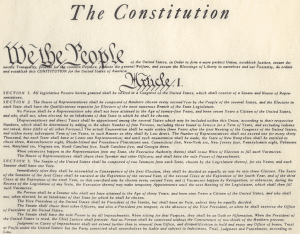On the Confederate flag flap, I’m going to probably confound some people with my comments. I am in complete agreement with removing the flag wherever it is an official symbol of a state government. At the same time, I’m profoundly concerned about the precedent this will set as the more radical portion of our political class attempts to extend their reach into other areas. Those views may sound contradictory initially, but if you stay with me, you’ll understand why I take the position I do.
I must deal first with the history and the constitutional issues. When the Southern states seceded from the Union, they did so on the basis of believing that the nation was merely a compact agreed upon by the states, and that any state was free to leave at any time for whatever reason.
That view, while earnestly held by Southerners at the time, is not accurate historically. The switch from the Articles of Confederation—which was in the nature of a treaty-like compact—to the Constitution was also a switch in the status of the nation-state relationship.
 The Constitution begins with the words “We the People,” not “We the States.” In fact, that is one big reason why Patrick Henry and other opponents of ratification argued against its adoption. They realized it was a change in status. State governments did not create this nation; rather, state conventions called particularly for the purpose of considering ratification made that decision.
The Constitution begins with the words “We the People,” not “We the States.” In fact, that is one big reason why Patrick Henry and other opponents of ratification argued against its adoption. They realized it was a change in status. State governments did not create this nation; rather, state conventions called particularly for the purpose of considering ratification made that decision.
As Lincoln observed later, the only way for a state to secede constitutionally was to once again become part of a convention that then sent out to the states a proposal for a state or states to withdraw from the Union. If ratified by conventions of the people in the various states, then they could leave peacefully.
That’s not what the Southern states did. They simply declared they were out.
As for the reasons for secession, those can be found very easily in the written declarations made by a number of those states. If you read them carefully, you will find that the overwhelming reason was concern over whether the federal government would end slavery.
What about states’ rights? Wasn’t that the key issue? Again, if you read those declarations, you will see that states’ rights was invoked for one purpose and one purpose only: to protect and propagate slavery.
 Further proof is found in the famous/infamous “Cornerstone” speech by Alexander Stephens, the vice president of the Confederacy, in which he says the Founders were wrong about one major point: the equality of the races. Stephens makes it clear in this speech that the Confederacy was founded on a different idea: the inferiority of Africans, their God-given place in society as slaves, and the superiority of the white race.
Further proof is found in the famous/infamous “Cornerstone” speech by Alexander Stephens, the vice president of the Confederacy, in which he says the Founders were wrong about one major point: the equality of the races. Stephens makes it clear in this speech that the Confederacy was founded on a different idea: the inferiority of Africans, their God-given place in society as slaves, and the superiority of the white race.
Again, if you doubt this, check it out for yourself.
Slavery, then, is at the root of the secession and the setting up of the Confederate government.
The Southerners also used the example of the Declaration of Independence in 1776 as the precedent for what they were doing. However, there are huge differences in the historical context of that document and what was transpiring in America in 1860-1861.
If the South could prove they were denied basic rights, as the colonies explained in 1776, no problem. However, let’s consider the following questions:
- First, did the Southern states lose representation in Congress? Answer: not at all. In fact, if they had not seceded, they still would have had a majority in the Congress. The only thing going against them was a Republican president, but he could not rule arbitrarily without Congress.
- Second, did the Southern states lose self-government within their own states? Again, not at all. They maintained their own legislatures and could make their own laws.
- Third, was any federal law passed that interfered with slavery in the states? Hardly. The entire history of the 1850s—from the Kansas-Nebraska Act to the Dred Scott decision by the Supreme Court—had favored the Southern view.
- Fourth, did federal armed forces invade any state? What armed forces? The federal government had very little in the way of an armed force. The small contingent at Ft. Sumter in Charleston harbor was no threat. By the way, that fort had been ceded to the federal government by South Carolina. To suddenly declare that it was the state’s fort was more than dubious.
Therefore, I see no constitutional basis for the secession. I view it as a revolt against the legitimate authority of the United States government, one that Lincoln, as president, had every right to put down.
Consequently, I have no love for a symbol of a government that illegitimately rebelled against proper authority. Remove the flag, by all means.
 Yet there are those concerns I mentioned at the beginning. Where will this lead? Already we are hearing voices saying all monuments from that era should be destroyed. One voice even questioned whether the Jefferson Memorial should be torn down. Another has concluded that the American flag itself should be shunned because America is the land of the “oppressor.”
Yet there are those concerns I mentioned at the beginning. Where will this lead? Already we are hearing voices saying all monuments from that era should be destroyed. One voice even questioned whether the Jefferson Memorial should be torn down. Another has concluded that the American flag itself should be shunned because America is the land of the “oppressor.”
That conveniently ignores that human societies throughout history have had slavery and that we, as a counterpoint to all that history, dared to challenge it—in a government symbolized by the Stars and Stripes. Thousands died en route to outlawing slavery. The government system that was established also eventually led to the elimination of segregation, that odious holdover from slavery days.
America is not the oppressor the radical Left seeks to portray. It is a nation that has had to struggle with the missteps and sins of the past and has overcome them (despite silly charges today of “white privilege” and “microaggressions”).
It is a nation that was born in the hope of justice for all, and which has achieved it to a greater degree than most others. The Left has an insatiable desire to destroy the good that has come down to us from the Founders, and it has an agenda to wipe out all trace of our heritage, based as it was on Biblical concepts of law and a Biblical view of morality.
So, yes, I applaud efforts to relegate the Confederate flag to museums, but not for the reasons some do. The South today is not overwhelmingly racist. Southerners who are nostalgic about their heritage are not full of hate. I see far more hatred and intolerance emanating from the Left than from any other source.
